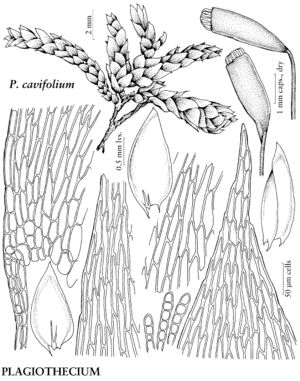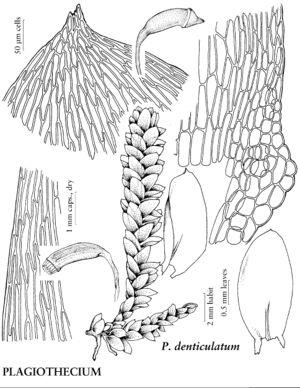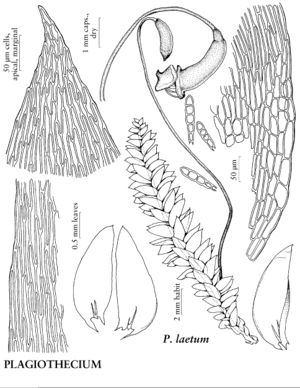Plants somewhat small to large, in loose to dense mats or tufts. Stems prostrate or erect, complanate-foliate, sometimes subjulaceous or julaceous, simple or sparsely and irregularly branched; cortical cells in external layer large, walls thin; pseudoparaphyllia absent; rhizoids sometimes present just distal to leaf insertion, at leaf base on abaxial surface, sometimes at leaf apices, smooth or minutely papillose. Stem and branch leaves similar, erect or spreading, sometimes secund with apices pointing toward substrate, imbricate to distant, scarcely altered when dry, flaccid, ovate, ovate-lanceolate, oblong-lanceolate, or oblong-ovate, symmetric or asymmetric, often concave, not plicate; base decurrent; margins plane or recurved, entire or serrulate to serrate at extreme apex, sometimes denticulate; apex acute, acuminate, or rarely piliferous; costa double, short, appearing single with one branch sometimes reaching mid leaf, or rarely ecostate; alar cells differentiated, walls ± evenly thick, region equally distributed on either side of costa, extending to decurrencies; laminal cells smooth; basal cell walls with few pits or rarely pitted to mid leaf; medial and distal cells linear, linear-flexuose, or sometimes linear-rhomboidal, heavily chlorophyllose, smooth, walls usually thin. Specialized asexual reproduction often present as propagula, cylindric to fusiform, 1-seriate, smooth. Sexual condition autoicous or sometimes dioicous; perigonia many at base of stems, bracts short, lanceolate to ovate, apex acuminate to filiform-acuminate; perichaetia many at base of stems, leaves moderately enlarged, sheathing, apex somewhat spreading. Seta single, elongate, straight or curved, twisted, smooth. Capsule cernuous, erect, or inclined, straight or arcuate; exothecial cell walls thin or thick; annulus deciduous, often tardily so; operculum conic to rostrate, shorter than urn; peristome double; exostome teeth with external surface cross striolate proximally, papillose distally, or rarely papillose throughout, internal surface projecting; endostome basal membrane medium to high, segments broad or narrow, shorter than or almost as long as teeth, keeled, not or very narrowly perforate, cilia present or absent, sometimes well developed. Calyptra fugacious, cucullate, naked. Spores spheric to ovoid, smooth or papillose.
Distribution
Nearly worldwide, including Antarctica, primarily in temperate latitudes and at higher elevations in the tropics.
Discussion
Genus 1, species ca. 90 (6 in the flora).
Although W. R. Buck and R. R. Ireland (1985) included only the genus Plagiothecium in Plagiotheciaceae, several bryologists (E. Nyholm 1954–1969; A. J. E. Smith 1978; Lin S. H. 1984; L. Hedenäs 1989b, 1995; N. Pedersen and L. Hedenäs 2002) have included other genera, especially some of those in Hypnaceae, in the family. Plagiothecium undulatum has been removed to Buckiella and placed in Hypnaceae (R. R. Ireland 2001).


